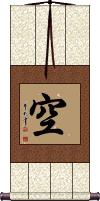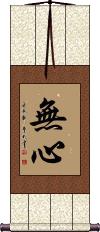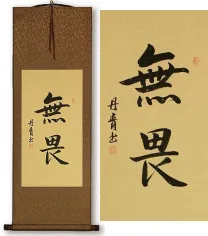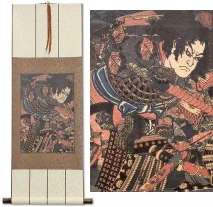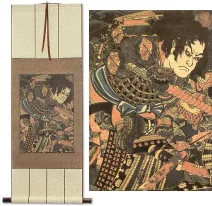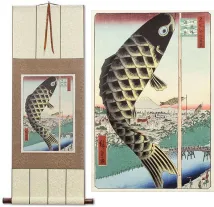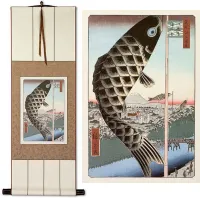Many custom options...
And formats...

The name No Ego in Chinese / Japanese...
Buy a No Ego calligraphy wall scroll here!
Personalize your custom “No Ego” project by clicking the button next to your favorite “No Ego” title below...
Sky / Ether / Void / Emptiness / Unreality
(Used in Japanese version of five elements)
空 is a single character that means empty, void, hollow, vacant, vacuum, blank, nonexistent, vacuity, voidness, emptiness, non-existence, immateriality, unreality, the false or illusory nature of all existence, and being unreal.
In the Buddhist context, this relates to the doctrine that all phenomena and the ego have no reality but are composed of a certain number of skandhas or elements, which disintegrate. The void, the sky, space. The universal, the absolute, complete abstraction without relativity. The doctrine further explains that all things are compounds, or unstable organisms, possessing no self-essence, i.e. are dependent, or caused, come into existence only to perish. The underlying reality, the principle of eternal relativity, or non-infinity, i.e. śūnya, permeates all phenomena making possible their evolution.
From Sanskrit and/or Pali, this is the translation to Chinese and Japanese of the title śūnya or śūnyatā.
In Japanese, when pronounced as “ron” (sounds like “roan”) this can be a given name. It should be noted that this Kanji has about 5 different possible pronunciations in Japanese: kuu, kara, sora, ron, and uro. 空 is also an element in the Japanese version of the five elements.
No Mind / Mushin
In Japanese, 無心 means innocent or without knowledge of good and evil. It literally means “without mind.”
無心 is one of the five spirits of the warrior (budo) and is often used as a Japanese martial arts tenet. Under that context, places such as the Budo Dojo define it this way: “No mind, a mind without ego. A mind like a mirror which reflects and dos not judge.” The original term was “mushin no shin,” meaning “mind of no mind.” It is a state of mind without fear, anger, or anxiety. Mushin is often described by the phrase “Mizu no Kokoro,” which means “mind like water.” The phrase is a metaphor describing the pond that clearly reflects its surroundings when calm but whose images are obscured once a pebble is dropped into its waters.
This has a good meaning in conjunction with Chan / Zen Buddhism in Japan. However, out of that context, it means mindlessness or absent-mindedness. To non-Buddhists in China, this is associated with doing something without thinking.
In Korean, this usually means indifference.
Use caution and know your audience before ordering this selection.
More info: Wikipedia: Mushin
This in-stock artwork might be what you are looking for, and ships right away...
Gallery Price: $108.00
Your Price: $59.88
Gallery Price: $108.00
Your Price: $59.88
Gallery Price: $61.00
Your Price: $33.88
Gallery Price: $61.00
Your Price: $33.88
Gallery Price: $61.00
Your Price: $33.88
Gallery Price: $61.00
Your Price: $33.88
Gallery Price: $61.00
Your Price: $33.88
Gallery Price: $108.00
Your Price: $59.88
Gallery Price: $90.00
Your Price: $49.88
Not the results for no ego that you were looking for?
Below are some entries from our dictionary that may match your no ego search...
| Characters If shown, 2nd row is Simp. Chinese |
Pronunciation Romanization |
Simple Dictionary Definition |
空 see styles |
kòng kong4 k`ung kung kuu / ku くう |
More info & calligraphy: Sky / Ether / Void / Emptiness / Unreality(1) empty air; sky; (2) {Buddh} shunyata (the lack of an immutable intrinsic nature within any phenomenon); emptiness; (3) (abbreviation) (See 空軍) air force; (noun or adjectival noun) (4) fruitlessness; meaninglessness; (noun or adjectival noun) (5) (See 五大・1) void (one of the five elements); (can be adjective with の) (6) {math} empty (e.g. set); (female given name) Ron śūnya, empty, void, hollow, vacant, nonexistent. śūnyatā, 舜若多, vacuity, voidness, emptiness, non-existence, immateriality, perhaps spirituality, unreality, the false or illusory nature of all existence, the seeming 假 being unreal. The doctrine that all phenomena and the ego have no reality, but are composed of a certain number of skandhas or elements, which disintegrate. The void, the sky, space. The universal, the absolute, complete abstraction without relativity. There are classifications into 2, 3, 4, 6, 7, 11, 13, 16, and 18 categories. The doctrine is that all things are compounds, or unstable organisms, possessing no self-essence, i.e. are dependent, or caused, come into existence only to perish. The underlying reality, the principle of eternal relativity, or non-infinity, i.e. śūnya, permeates all phenomena making possible their evolution. From this doctrine the Yogācārya school developed the idea of the permanent reality, which is Essence of Mind, the unknowable noumenon behind all phenomena, the entity void of ideas and phenomena, neither matter nor mind, but the root of both. |
無我 无我 see styles |
wú wǒ wu2 wo3 wu wo muga むが |
More info & calligraphy: Selflessness(1) selflessness; self-effacement; self-renunciation; (2) {Buddh} anatta; anatman; doctrine that states that humans do not possess souls; (female given name) Muga anātman; nairātmya; no ego, no soul (of an independent and self-contained character), impersonal, no individual independent existence (of conscious or unconscious beings, anātmaka). The empirical ego is merely an aggregation of various elements, and with their disintegration it ceases to exist; therefore it has nm ultimate reality of its own, but the Nirvāṇa Sūtra asserts the reality of the ego in the transcendental realm. The non-Buddhist definition of ego is that it has permanent individuality 常一之體 and is independent or sovereign 有主宰之用. When applied to men it is 人我, when to things it is 法我. Cf. 常 11. |
自尊 see styles |
zì zūn zi4 zun1 tzu tsun jison じそん |
More info & calligraphy: Self-Respect / Self-Esteemself-respect; esteem; self-importance; pride |
自尊心 see styles |
zì zūn xīn zi4 zun1 xin1 tzu tsun hsin jisonshin じそんしん |
More info & calligraphy: Prideful Mind / Self-Respecting Heartself-esteem; self-respect; self-importance; conceit; pride |
我 see styles |
wǒ wo3 wo ga が |
I; me; my (1) {Buddh} obstinacy; (2) atman; the self; the ego I, my, mine; the ego, the master of the body, compared to the ruler of a country. Composed of the five skandhas and hence not a permanent entity. It is used for ātman, the self, personality. Buddhism takes as a fundamental dogma 無我, i.e. no 常我, no permanent ego, only recognizing a temporal or functional ego. The erroneous idea of a permanent self continued in reincarnation is the source of all illusion. But the Nirvana Sutra definitely asserts a permanent ego in the transcendental world, above the range of reincarnation; and the trend of Mahāyāna supports such permanence; v. 常我樂淨. |
見 见 see styles |
xiàn xian4 hsien mi み |
to appear; also written 現|现[xian4] (n-suf,n) (1) looking; viewing; (expression) (2) (colloquialism) (kana only) (after the -te form of a verb; irreg. imperative conj. of 見る) (See 見る・5) (please) try (to); (female given name) Miru darśana, 捺喇捨曩; also dṛṣṭi; seeing, discerning, judgment, views, opinions; it is thinking, reasoning, discriminating, selecting truth, including the whole process of deducing conclusions from premises. It is commonly used in the sense of wrong or heterodox views or theories, i. e. 邪見 or 有見, especially such as viewing the seeming as real and the ego as real. There are groups of two, four, five, seven, ten and sixty-two kinds of 見. |
えこ see styles |
ego エゴ |
(1) ego (lat:); (2) (abbreviation) (See エゴイズム) egoism; (3) (abbreviation) (See エゴイスト) egoist; (female given name) Eko |
三修 see styles |
sān xiū san1 xiu1 san hsiu san shū |
The three ways of discipline, i.e. three śrāvaka and three bodhisattva ways. The three śrāvaka ways are 無常修 no realization of the eternal, seeing everything as transient; 非樂修 joyless, through only contemplating misery and not realizing the ultimate nirvāṇa-joy; 無我修 non-ego discipline, seeing only the perishing self and not realizing the immortal self. The bodhisattva three are the opposite of these. |
三結 三结 see styles |
sān jié san1 jie2 san chieh miyui みゆい |
(female given name) Miyui The three ties: (a) 見結 , the tie of false views, e.g. of a permanent ego; (b) 戒取結 of discipline; (c) 疑結 of doubt. The three are also parts of見惑 used for it. |
主我 see styles |
shuga しゅが |
ego; self |
主観 see styles |
shukan しゅかん |
(1) subjectivity; subject (philosophical); ego; (2) one's personal opinion; one's own idea |
九道 see styles |
jiǔ dào jiu3 dao4 chiu tao kudō |
idem 九有情居.; The nine truths, or postulates: impermanence; suffering; voidness (or unreality of things); no permanent ego, or soul; love of existence or possessions, resulting in suffering; the opposite (or fear of being without them), also resulting in suffering; the cutting off of suffering and its cause; nirvāṇa with remainder still to be worked out; complete nirvāṇa. |
二執 二执 see styles |
èr zhí er4 zhi2 erh chih nishū |
The two (erroneous) tenets, or attachments: (1) 我執 or 人執 that of the reality of the ego, permanent personality, the ātman, soul or self. (2) 法執 that of the reality of dharma, things or phenomena. Both are illusions. "All illusion arises from holding to the reality of the ego and of things." |
五見 五见 see styles |
wǔ jiàn wu3 jian4 wu chien gomi ごみ |
(surname) Gomi The five wrong views: (1) 身見 satkāya-dṛṣṭi, i. e. 我見 and 我所見 the view that there is a real self, an ego, and a mine and thine: (2) 邊見 antar-grāha, extreme views. e. g. extinction or permanence; (3) 邪見 mithyā, perverse views, which, denying cause and effect, destroy the foundations of morality; (4) 見取見 dṛṣṭi-parāmarśa, stubborn perverted views, viewing inferior things as superior, or counting the worse as the better; (5) 戒禁取見 śīla-vrata-parāmarśa, rigid views in favour of rigorous ascetic prohibitions, e. g. covering oneself with ashes. Cf. 五利使. |
人執 人执 see styles |
rén zhí ren2 zhi2 jen chih ninshū |
The (false) tenet of a soul, or ego, or permanent individual, i.e. that the individual is real, the ego an independent unit and not a mere combination of the five skandhas produced by cause and in effect disintegrating; v. 我執. |
人空 see styles |
rén kōng ren2 kong1 jen k`ung jen kung ningū |
Man is only a temporary combination formed by the five skandhas and the twelve nidānas, being the product of previous causes, and without a real self or permanent soul. Hīnayāna is said to end these causes and consequent reincarnation by discipline in subjection of the passions and entry into nirvana by the emptying of the self. Mahāyāna fills the "void" with the Absolute, declaring that when man has emptied himself of the ego he realizes his nature to be that of the absolute, bhūtatathatā; v. 二空. |
作者 see styles |
zuò zhě zuo4 zhe3 tso che sakusha さくしゃ |
author; writer creator (of a work); author; writer; artist; composer; playwright; dramatist kartṛ; a doer, he who does things, hence the ātman, ego, or person within; the active element, or principle; one of the sixteen non-Buddhist definitions of the soul. Also kāraṇa, a cause, maker, creator, deity. |
依怙 see styles |
yī hù yi1 hu4 i hu eko えこ |
favoritism; favouritism; partiality; prejudice; bias; (surname) Ego To rely on, depend on. |
依業 依业 see styles |
yī yè yi1 ye4 i yeh egō |
karma-basis |
依語 依语 see styles |
yī yǔ yi1 yu3 i yü ego |
depending on language |
俗我 see styles |
sú wǒ su2 wo3 su wo zokuga |
The popular idea of the ego or soul, i.e. the empirical or false ego 假我 composed of the five skandhas. This is to be distinguished from the true ego 眞我 or 實我, the metaphysical substratum from which all empirical elements have been eliminated; v.八大自在我. |
倒我 see styles |
dào wǒ dao4 wo3 tao wo tōga |
The conventional ego, the reverse of reality. |
倒見 倒见 see styles |
dào jiàn dao4 jian4 tao chien tōken |
Cf. 顚 19. Upside-down or inverted views, seeing things as they seem, not as they are, e.g. the impermanent as permanent, misery as joy, non-ego as ego, and impurity as purity. |
倶空 see styles |
jù kōng ju4 kong1 chü k`ung chü kung kukū |
Both or all empty, or unreal, i.e. both ego and things have no reality. |
假我 see styles |
jiǎ wǒ jia3 wo3 chia wo ke ga |
The empirical ego of the five skandhas. |
內我 内我 see styles |
nèi wǒ nei4 wo3 nei wo naiga |
The antarātman or ego within, one's own soul or self, in contrast with bahirātman 外我 an external soul, or personal, divine ruler. |
分身 see styles |
fēn shēn fen1 shen1 fen shen bunshin(p); bunjin(ok) ぶんしん(P); ぶんじん(ok) |
(of one who has supernatural powers) to replicate oneself so as to appear in two or more places at the same time; a derivative version of sb (or something) (e.g. avatar, proxy, clone, sockpuppet); to spare some time for a separate task; to cut a corpse into pieces; to pull a body apart by the four limbs; parturition (1) other self; alter ego; part of oneself (in someone or something else); representation of oneself; (2) {Buddh} incarnations of Buddha Parturition: in Buddhism it means a Buddha's power to reproduce himself ad infinitum and anywhere. |
利使 see styles |
lì shǐ li4 shi3 li shih rishi |
The sharp or clever envoy, i.e. the chief illusion of regarding the ego and its experiences and ideas as real, one of the five chief illusions. |
受者 see styles |
shòu zhě shou4 zhe3 shou che jusha |
A recipient (e. g. of the rules). The illusory view that the ego will receive reward or punishment in a future life, one of the sixteen false views. |
営伍 see styles |
eigo / ego えいご |
(personal name) Eigo |
Click here for more no ego results from our dictionary
The following table may be helpful for those studying Chinese or Japanese...
| Title | Characters | Romaji (Romanized Japanese) | Various forms of Romanized Chinese | |
| Sky Ether Void Emptiness Unreality | 空 | kuu / kara / sora / ron ku / kara / sora / ron | kōng / kong1 / kong | k`ung / kung |
| No Mind Mushin | 無心 无心 | mu shin / mushin | wú xīn / wu2 xin1 / wu xin / wuxin | wu hsin / wuhsin |
| In some entries above you will see that characters have different versions above and below a line. In these cases, the characters above the line are Traditional Chinese, while the ones below are Simplified Chinese. | ||||
Successful Chinese Character and Japanese Kanji calligraphy searches within the last few hours...
